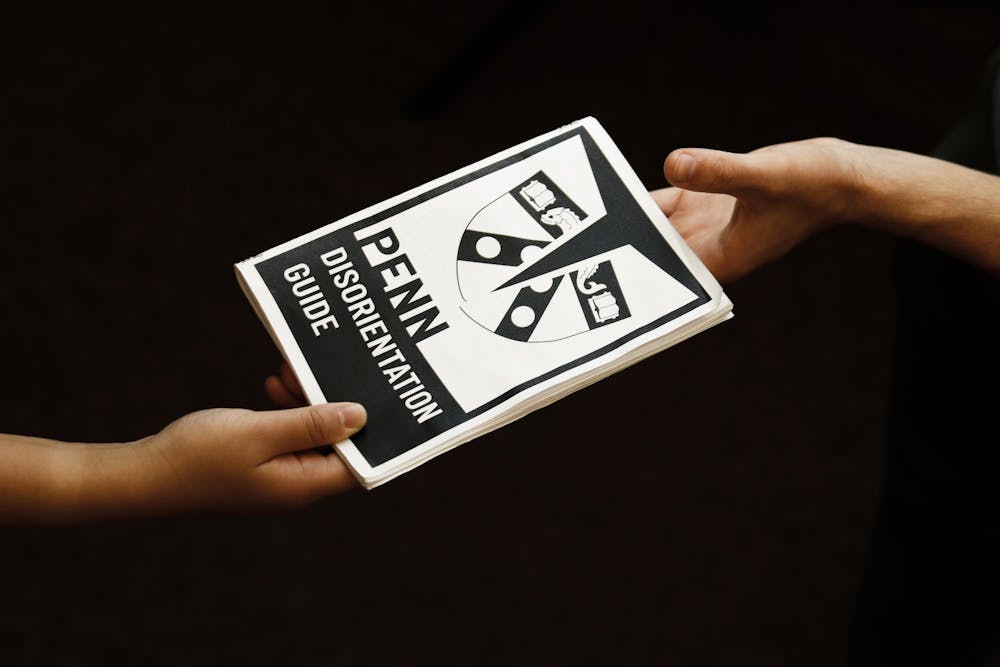Although most first-year students are starting off their Penn careers from the comfort of their homes, campus activist groups are finding ways to reach the Class of 2024 virtually and share their critiques of Penn’s impact on the school community and the city of Philadelphia.
“Disorientation Guide 2020,” published online on Oct. 3, features a series of essays divided into two categories: “Penn’s Impact on Philadelphia and the World” and “Penn’s Impact On Its Students and Staff." The guide, published previously in 2017 and 2019, was written by various student groups including Penn Community for Justice, Police Free Penn, the Penn Slavery Project, Fossil Free Penn, Philly Jobs with Justice, and the Coalition Against Fraternity Sexual Assault.
The essays cover topics ranging from Penn's history with slavery, its refusal to pay Payments In Lieu of Taxes to help fund the Philadelphia public school district, and rape culture at Penn. The guide concludes with a list of the student-run organizations students can join to help fight against these injustices at Penn.
“Penn works very hard to present a favorable picture of itself and its engagement with the surrounding community,” the guide’s welcome letter reads. “This guide attempts to present a more honest picture of our school.”
In previous years, the guide was distributed to students at Convocation and other New Student Orientation events in the form of a physical pamphlet. This year, the groups involved in creating the guide decided to publish the guide online due to the remote fall semester.

College senior Amanpreet Singh, who previously wrote for The Daily Pennsylvanian and 34th Street Magazine, contributed to the guide by editing essays about rape culture and fraternities at Penn as part of CAFSA. The essays condemn the presence of fraternity houses on Locust Walk and Penn’s alleged failure to address sexual assault on campus.
"The most common space sexual assault occurs on campus is residence halls and fraternities," the essay titled "Rape Culture at Penn" reads. "Penn has done nothing to challenge the contribution of frats to campus life."
RELATED:
Penn’s history of refusing to pay PILOTs, explained
Penn & Slavery Project urges U. to further address racism after removing Whitefield statue
As a senior, Singh said she felt a responsibility to inform new students about ongoing issues at Penn, including the University's refusal to pay PILOTS, maintenance of a large police force, and lack of support and funding for ethnic studies departments at Penn.
“Penn likes to push this narrative of what they do as a school, like the fact that they support West [Philadelphia] though the Netter Center and other programs, but when you dig deeper and you look behind Penn’s lies, you see that there are so many issues Penn is completely unwilling to be transparent on,” Singh said.
Similar to Singh, Engineering junior Janine Liu, who contributed to the artwork for last year's guide, decided to become more involved with the guide this year by helping build the website. They said they felt a responsibility as an upperclassman to inform younger students about the ways Penn has failed its community members on campus and in Philadelphia.
“It's really important for us to pass that knowledge down through to the upcoming generations, because it's important that we hold Penn accountable for its failures that it refuses to properly address,” Liu said.
Liu said they tried to preserve the pamphlet format as much as possible while creating the guide by including links at the bottom of each essay to flip to the previous or next page.
On the guide's launch day, Liu said the website recorded over 4,000 views in comparison to the 250 physical copies organizers distributed last year to the Class of 2023.
Liu said the goal of the guide is not to make first years hate Penn, but to let them know that they might experience a lack of resources if they are a person of color, victim of sexual assault, or member of another marginalized group, due to the University’s shortcomings.
College first year Zane Pasha said he believes the guide is an important resource to first-year students, especially because they do not yet understand Penn’s full impact on the Philadelphia community.
“I feel like we’re getting a really watered-down version of what the actual logistics of Penn existing in the area means for the residents there and how much impact it has on the city of Philadelphia,” Pasha said.
He added that the guide has encouraged him to become more involved in the issues addressed in the guide as a member of Fossil Free Penn. Pasha also shared the guide in a Class of 2024 group chat to bring awareness to other students about these issues at Penn.
College first year Samuel Cheever, who found out about the guide from social media, said the guide touched on many issues that were not mentioned during NSO events informing first-year students about Penn's resources.
He added that he thinks it is hypocritical for the University to promote its community service in West Philadelphia while refusing to pay PILOTS.
“Every student should read the guide,” Cheever said. “Exposing ourselves to the flaws and fixes that we need to make to our institution will help us make improvements, make genuine strides toward a more just institution.”









